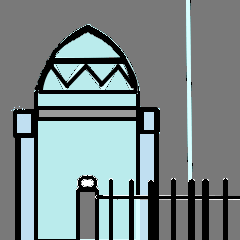As it happened, Addison was the last speaker of the evening. He really felt he had so much more to say, but at last Smiling Jack came up to him, excused himself, and told Addison that the group only had the use of the church basement until eight P.M.
“What? You mean we have to leave?”
“I’m afraid so, old buddy. New Testament bible study group has the room next.”
“Oh, well, in that case,” said Addison.
“You can continue next time,” said Smiling Jack.
“Next time?”
“Wouldn’t you like to come again?”
“Oh, sure, why not?”
The room was already emptying out, and in fact, Addison couldn’t have helped but notice that at least half the other people in the room had left while he was speaking.
Outside in the church courtyard, the early-September night was falling. A group of people stood around the side entrance, bibles in hand.
Smiling Jack offered Addison another Lucky Strike, and he lighted them both up with his Zippo.
“So what did you think, Addison?”
“Oh, I thought it was wonderful,” said Addison. “You know, I’ve never had an experience like that before, a whole roomful of people listening to me talk.”
“Well, that’s one of the cornerstones of the program, buddy. People with the same disease, listening to each other tell their stories.”
“People with the same disease?”
“Alcoholism, buddy!”
“Oh, right,” said Addison. “Yes, I suppose that is a sort of disease, isn’t it?”
“We believe so, brother.”
“But isn’t all of life a sort of disease?”
“I beg your pardon?”
“I mean, you catch the disease of life as soon as you are pulled screaming from your mother’s womb, and then you start to die.”
Smiling Jack’s smile had faltered, but now it returned.
“Heh heh, you slay me, Addison!”
“So how was I?”
“How were you?”
“My, my, what do you call it –”
“Your testimony?”
“Yes.”
“May I be honest, old chum?”
“Oh, by all means, please, be brutally honest.”
“You went on maybe just a little too long, buddy.”
“I did?”
“Just a little.”
“I didn’t know there was a time limit.”
“The thing is, we like to give others a chance to talk too, old boy.”
“Oh, I’m sorry, Jack. It is Jack, isn’t it?”
“Jack it is! Smiling Jack, that’s me.”
“I’ll try to remember not to wax too verbosely next time. Next time I’ll try to keep it under an hour if I can.”
“Twenty minutes might be a good goal,” said Smiling Jack.
“Twenty?”
“That’s what we try to keep it to, buddy. So that other people can have a chance to talk.”
“Twenty minutes?”
“Yes, twenty minutes, pal.”
“Well, I could certainly try to reign myself in–”
“And one other thing.”
“Yes?”
“And please don’t take this the wrong way.”
“What’s the wrong way?”
“Please don’t be offended by what I am about to say, old buddy.”
“Oh, dear, what is it? I was boring, wasn’t I? That’s what those bums up at Bob’s Bowery Bar always tell me. ‘Shut up, Addison. you’re boring. Put a lid on it, Addison, nobody wants to hear it. God, you’re fucking boring, Addison.’ So you’re saying I was boring.”
“It’s not that so much, buddy.”
“It isn’t? Oh, thank God. I should hate to think I was boring, and to be honest I did wonder why so many people got up and left while I was speaking. I thought that was rather rude of them.”
“Maybe they had places to be, Addison.”
“Yes, that was probably it.”
“But here’s the thing –” said Smiling Jack.
“I was too diffuse, wasn’t I? But you see, Jack, I was not expecting to speak this evening, and so that whole performance was ex tempore, you see. Next time I’ll prepare an outline, perhaps, maybe some index cards as to the topics I want to touch on.”
“Well, that’s the thing I wanted to mention, buddy. The topics.”
“I went on too long about Joyce versus Woolf, didn’t I?”
“Well –”
“And perhaps my thoughts on Heidegger should have been relegated to a whole evening for themselves.”
“Yes, perhaps, but, here’s the thing, Addison, the organization is called Alcoholics Anonymous.”
“Yes, so I gathered.”
“And so, traditionally, if you get up to speak, you’re expected to speak about your problems with alcohol.”
“Oh. But could not that get a little, shall we say, dreary?”
“Perhaps, my friend, and, yes, to be quite honest, there’s not usually a whole lot of laughs at these meetings, but –”
“There certainly were not with those speakers who preceded me. Good God! Could they have been any more grim?”
“Heh heh, maybe not, old buddy, but you see we don’t come to these rooms for laughs, Addison, we come to help each other stay sober.”
“Oh.”
“And we do this by listening to each other’s stories.”
“I see.”
“And telling our own stories.”
“That’s what I liked about it,” said Addison. “Telling my story. I’ll try to do better next time.”
“If I may gently suggest, old buddy, just try to stick to your story as it relates to your illness.”
“My illness?”
“Your alcoholism.”
“Oh, right. Sure, I suppose I can do that,” said Addison, “maybe.”
“Addison, chum, I’m going to propose that you let me be your sponsor.”
“My sponsor?”
“Yes. Just someone in the program who’s there to help you. To lend an ear. If you should need an ear.”
“Gee, thanks,” said Addison, “uh –”
“Jack,” said Smiling Jack.
“Yes – Jack,” said Addison.
“Smiling Jack, that’s me.”
“Smiling Jack,” said Addison.
They were still standing in the courtyard, by the side entrance of the church. The people in the New Testament bible study group had all gone inside. It was was full dark now, and the streetlights had come on. The stub ends of the two Lucky Strikes glowed in the dimness.
“So, where are you off to, Smiling Jack?” said Addison.
“I was thinking of getting a bite to eat somewhere, Addison. Would you care to join me?”
“I only have a dollar and seventy-six cents on me.”
“My treat.”
“Oh, well, if you insist.”
“I insist, old buddy.”
“I could really go for a cold beer, too,” said Addison. “What’s today, Tuesday?”
“Um, yes,” said Smiling Jack.
“Y’know, if we head up to Bob’s Bowery Bar, I think on Tuesdays they have Bob’s Mom’s Irish stew special, quite reasonable too, just a dollar, and with your choice of a fresh-baked roll or Uneeda crackers. Goes really well with Bob’s basement-brewed bock.”
“Well, I don’t know about the bock, Addison, old chum.”
“Well, if the bock’s too strong for you, he’s got Rheingold on tap, that’s pretty light, and it should also go quite well with the Irish stew I should think.”
“Addison, old chum, I don’t drink.”
“What, not even beer?”
“Not even beer. You see, I’m an alcoholic, buddy.”
“Oh, right. I forgot.”
“And if I am not very much mistaken, I think you’re an alcoholic, too, Addison.”
“Yes, sure, of course, but just a bock or two –”
“A bock or two leads to a bock or two dozen, old friend.”
And Addison remembered the previous day and night. Yes, it had been at least two dozen bocks, speaking conservatively.
“I’ve got an idea, pal,” said Smiling Jack. “Do you know Ma’s Diner? It’s right near Bob’s, up on the corner of Bleecker and the Bowery –”
“Ma’s Diner? I live right across the street –”
“Well, what say you and me go there and see what ol’ Ma has on her Tuesday night specials?”
“Well, Ma doesn’t have a liquor license, you know. No beer there, or bock –”
“She makes a terrific pot of chicory coffee, though. And wonderful iced sweet tea.”
“Yes, her chicory coffee and sweet tea are pretty good –”
“Let’s take a stroll up to Ma’s, old buddy.”
“Well, okay,” said Addison. “Since you’re treating.”
“Yes, since I’m treating,” said Smiling Jack.
And they passed through the courtyard and out through the iron gate. The thing was, thought Addison, after a nice meal at Ma’s (and, yes, he was starving!), he could say good night to Smiling Jack, and then discreetly head over to Bob’s, where a dollar and seventy-six cents would go a long way in the bock department.
























































